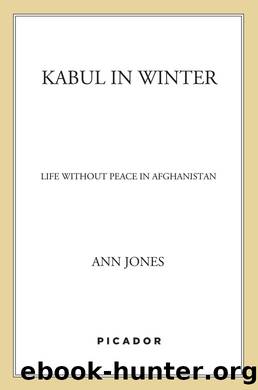Kabul in Winter by Ann Jones

Author:Ann Jones
Language: eng
Format: epub
Publisher: Henry Holt and Co.
Published: 2012-07-27T00:00:00+00:00
AT MADAR, WE ALWAYS START THE DAY WITH AN ENGLISH LESSON for the staff women. Even on March 8.
âToday we have a party,â I say. âWhy do we have a party?â
âBecause today International Woman Day!â one woman says, stumbling over the clutter of âinternational.â
âWhat do we do at the party?â
They call out answers in a swift, imperfect review of simple verbs: âWe dance. We sing. We happy. We eat. We drink tea. We beautiful. We talk.â
âWhat do we talk about?â
âWe talk about womenâs rights,â Moska says.
âWhat are womenâs rights?â I ask. Silence. Everyone but Moska looks blank until Nilofar the dressmaker ventures, âWhat we want? Go to job?â
âYes,â says Hosai. âGo to office.â
I write on the chalkboard: The right to work.
âMaktab,â says the widow Meryam. âStoody Inglesh.â
âSchool,â says Taiba. She helps Meryam write the English word for maktab in her notebook. I write on the board: The right to go to school. The right to education.
Happily married Hosai offers, âRight to husband cook.â
âRight to husband clean,â crows Taiba, who escaped from a violent marriage to a powerful mujahidin commander. âRight to husband sweep.â
Thereâs no need to tell them about Western feministsâ renegotiation of housework nearly half a century ago; theyâve come up with the idea themselves. Besides, I see that in Hosaiâs household, headed by a gentle man, ideas of fairness already arise.
Nadia says, âRight to no husband,â and everyone laughs. She points to the chalkboard, and I write: The right to choose your husband. A discussion in Dari ensues about the meaning of the unknown word âchoose,â and heads begin to nod seriously. Hereâs the crux of the issue for them: who picks? Of all the women in the room only the widow Meryam selected her own husband. Hosaiâs parents arranged her engagement when she was five and married her at age thirteen to her twenty-two year-old fiancé. Later, after sheâd given birth to three children, she went through a period of hating her husband for stealing her youth. Like many Afghan women sheâd been living âshir ba shirâ (from milk to milk)âfrom lactation to pregnancy to lactation and pregnancy again, with no menses in between. But later still, after three more children, and the death of two, she somehow grew to love her husband and think herself a lucky woman. They had become companions.
I write on the board: The right to vote. This is 2004. All faces turn to me eagerly, anticipating something new, and Homaira asks, âWhat means vote?â I pantomime writing on a piece of paper, folding it, and handing it over, saying, âKarzai. No Karzai. Vote. Choose the president.â Thereâs that word âchooseâ again. âKarzai. No Karzai.â Light crosses their faces. âOh, vote. Baly. Yes. Vote.â Theyâve got the word, and the concept, but I see theyâre not impressed. What can choosing a president mean to women who cannot choose a husband? Other things are more important. The right to survive, and the thing nobody mentions: the right to their own bodiesâthe right to safety, security, freedom from violence, peace.
Download
This site does not store any files on its server. We only index and link to content provided by other sites. Please contact the content providers to delete copyright contents if any and email us, we'll remove relevant links or contents immediately.
| Central Asia | Southeast Asia |
| China | Hong Kong |
| India | Japan |
| Korea | Pakistan |
| Philippines | Russia |
The Rape of Nanking by Iris Chang(3526)
The Sympathizer by Viet Thanh Nguyen(3510)
World without end by Ken Follett(3010)
Ants Among Elephants by Sujatha Gidla(2928)
Blood and Sand by Alex Von Tunzelmann(2611)
Japanese Design by Patricia J. Graham(2562)
City of Djinns: a year in Delhi by William Dalrymple(2139)
Inglorious Empire by Shashi Tharoor(2103)
In Order to Live: A North Korean Girl's Journey to Freedom by Yeonmi Park(2062)
Foreign Devils on the Silk Road: The Search for the Lost Treasures of Central Asia by Peter Hopkirk(2059)
Tokyo by Rob Goss(2022)
India's biggest cover-up by Dhar Anuj(1989)
India's Ancient Past by R.S. Sharma(1988)
The Great Game: On Secret Service in High Asia by Peter Hopkirk(1962)
Tokyo Geek's Guide: Manga, Anime, Gaming, Cosplay, Toys, Idols & More - The Ultimate Guide to Japan's Otaku Culture by Simone Gianni(1949)
Goodbye Madame Butterfly(1938)
The Queen of Nothing by Holly Black(1760)
Living Silence in Burma by Christina Fink(1734)
Batik by Rudolf Smend(1724)
